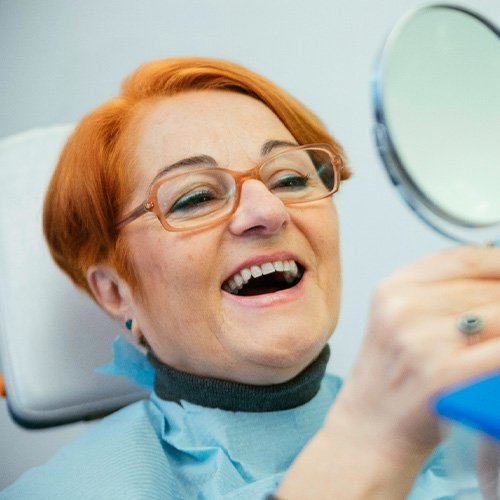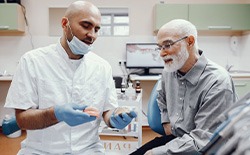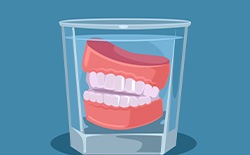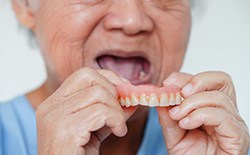Dentures – Lacey, WA
Tried-and-True Tooth Replacement
For patients who’ve experienced advanced tooth loss, partial and full dentures offer a reliable restoration option. It’s important to replace missing teeth to ensure your smile looks, feels, and functions naturally. At Peterson & Cammack Family & Cosmetic Dentistry, we offer a wide range of restorative dentistry services that are customized to fit your needs. If you have questions or need help repairing your smile following advanced tooth loss, call our Lacey dental office to schedule a tooth replacement consultation today. We’ll evaluate your current state of oral health, explain your treatment options, and help you put the smile back on your face with dentures in Lacey, WA.
Why Choose Peterson & Cammack Family & Cosmetic Dentistry for Dentures?
- Customized, Natural-Looking Dentures
- We Proudly Accept Dental Insurance
- Experienced & Friendly Dentists
Who’s a Good Candidate for Dentures?

Dentures are an excellent solution for those who have lost several or all of their teeth. Whether due to injury, decay, or other oral health issues, replacing missing teeth is necessary to keep your smile beautiful and functioning properly. At Peterson and Cammack Family and Cosmetic Dentistry, Dr. Venn Peterson and Dr. Spenser Cammack offer personalized appliances to meet the unique needs of each patient. If you’re struggling with tooth loss, read more below to learn how our team assesses denture candidacy. Then, give us a call to schedule your consultation and see if dentures could work for you!
Effects of Missing Teeth

Living with missing teeth can affect far more than just the way your smile looks. Without finding suitable replacements, you could experience:
- Bone Loss: Without the stimulation provided by natural teeth, your jawbone can begin to deteriorate, leading to further facial changes and a sunken appearance.
- Nutritional Deficiencies: Missing teeth can make chewing certain foods challenging. Many times, patients will simply ignore certain foods altogether, leading to a lack of some nutrients.
- Speech Impediments: Your teeth are a big part of your ability to pronounce words. Without them, it can make conversations with friends and loved ones difficult.
- Shifting Teeth: The absence of teeth can cause neighboring teeth to shift, leading to misalignment and oral health issues.
- Lowered Self-Esteem: Many patients are extremely unhappy with their smiles after losing teeth. This constant reminder can lead to lower self-esteem as well as feelings of anxiety or depression.
Replacing missing teeth with dentures can help address these issues, improving your overall quality of life!
What Are the Qualities of a Great Candidate for Dentures?

It can be difficult to determine whether dentures are the right choice for you without having a consultation with us first. However, if you want a general idea of what a good denture candidate looks like, here are some of the best qualities to have:
- Multiple missing teeth or total tooth loss
- Good oral hygiene and healthy gums
- Sufficient jawbone structure to support your dentures
- The desire to improve both the function and appearance of your smile
- Need for a cost-effective tooth replacement solution
If you're committed to oral hygiene and the continual care of your dentures, they could be an ideal solution for you!
Alternative Tooth-Replacement Options

While dentures are a reliable option, they aren’t for everyone. Luckily, we offer alternative tooth-replacement solutions that may better suit your needs, such as:
- Dental Bridges: A non-removable tooth replacement treatment for replacing a few missing teeth in a row. Bridges are anchored by adjacent teeth and provide a sturdier solution than partial dentures.
- Dental Implants: A more stable and permanent tooth replacement option that mimics the look and function of natural teeth. Implants are surgically placed into your jawbone and can be fitted with multiple types of restorations from crowns to bridges and even dentures! While they do require a higher up-front investment, they can last a lifetime with proper care.
At your consultation, Dr. Peterson or Dr. Cammack will examine your mouth and help you explore all tooth-replacement options to find the best fit for your lifestyle and oral health needs. So, don’t delay, call us today!
The Importance of Replacing Missing Teeth

Without your teeth, basic daily functions like chewing, speaking, or smiling can be difficult. Even one missing tooth can cause concerns. When left unreplaced, a single missing tooth will allow surrounding teeth to shift to fill in the gap. Additionally, the supportive bone and gum tissue structures will begin to breakdown without stimulation from tooth roots, which can lead to further tooth loss. By replacing a single tooth, our team can often prevent further tooth loss, but if you’ve already experienced advanced tooth loss, it’s still essential that you repair your smile to ensure you’re able to eat a variety of foods, speak clearly, and smile confidently.
Types of Dentures

If you’re missing several or all of your teeth along an arch, our full or partial dentures can help restore your arch and improve your quality of life.
Partial Denture

Partials are used to replace numerous missing teeth while preserving healthy tooth structure. The partial is crafted using a gum-colored base material to support numerous replacement teeth. The prosthetic is attached to surrounding healthy teeth using metal clasps to support the partial denture.
Full Dentures

Similar to partial dentures, full dentures use a gum-colored base material to support the full row of replacement teeth. Because there are no remaining healthy teeth to support the restoration, the denture is formed to fit against the gum line. The snug fit between the denture and soft tissue creates suction that holds the denture in place. Some patients also use a small amount of denture adhesive to improve the stability of the full denture.
Implant Dentures

If you want to improve the stability of your tooth replacement prosthetic, an implant denture may be a good option. Dental implants are posts inserted below the gum line. They mimic the natural function of lost root structures and provide support for any number of replacement teeth.
Dentures Aftercare

Dentures are lifechanging tooth replacement option for those who have suffered from significant tooth loss. They are able to restore the appearance and function of your smile. However, to ensure that they last, it’s important that you are taking all of the proper steps to care for them. Here are some of the ways that you can keep your replacement teeth in excellent shape for many years down the road.
Remove After Eating

After each of your meals, you should take out your dentures and rinse them off. This will help to prevent the buildup of food debris, plaque, and harmful bacteria. When rinsing your dentures, be careful that the water isn’t too hot. High temperatures can warp the denture material, causing it to no longer fit properly.
Clean Your Restoration

When it’s time to clean your dentures, you should remove them from your mouth. Use a soft bristled toothbrush and a small amount of unscented hand soap, milk dish soap, or denture cleanser, to gently brush your denture. If you aren’t going to be wearing your denture again right away, put them in a container of water or denture-cleaning solution so they don’t dry out and lose their shape. Remember to always thoroughly rinse your dentures before placing them back in your mouth.
Keep Your Dentures Safe

When you clean your dentures, it’s a good idea to place a towel beneath them just in case they slip out of your hands. This will reduce the probability of them becoming damaged. When you aren’t wearing your dentures, be sure to keep them in a place that is inaccessible to pets and young children.
Remove Dentures When You Sleep

It is best to take your dentures out at night before you go to sleep. Wearing dentures restricts the circulation in your gum tissue, resulting in soft-tissue irritation. Sleeping with dentures has also been associated with a higher risk of pneumonia and higher levels of gum and tongue plaque. Overnight, keep your dentures in a denture soaking solution. Don’t let them dry out because they can lose their shape.
Notice Changes

You should always be on the lookout for changes so you can address them with your dentist. This includes mouth sores, gum irritation, and signs of infection. If your dentures become damaged, you shouldn’t try to repair them on your own. You could accidentally damage them further. Instead, give us a call so we can help.
Understanding the Cost of Dentures

After tooth loss, it can be difficult to find the resources you need for good replacements. At Peterson & Cammack Family & Cosmetic Dentistry, we want to ensure that every patient has accessible care that can improve their quality of life. However, to achieve a rejuvenated smile with dentures, you need a clear understanding of the investment involved. Read more below to learn what influences the price of dentures and how we help our patients find a solution that fits their budget.
Factors that Affect the Cost of Dentures

Every smile is unique, so no two dentures are ever the same. This is why quoting an exact price is next to impossible without a consultation. Here are some of the ways the price of your prosthetics may change:
- Pre-denture Preparation: Tooth extractions or treatments like bone grafting may be necessary, incurring extra cost.
- Acrylic Quality: Higher-quality materials used for the denture base can affect the price.
- Replacement Teeth Materials: Denture teeth made from durable porcelain or other high-quality mediums ensure longevity and a natural appearance.
- Denture Type: Partial dentures generally cost less than full or implant models.
While cheaper denture materials and types are available, it’s important to note that quality has a huge impact on your experience. Investing in better options makes them generally more comfortable and longer-lived.
Are Implant Dentures More Expensive?

Implant dentures are often the more expensive option, but the cost is reflective of the quality and the numerous benefits they offer! For example, because these dentures are anchored to dental implants placed in your jawbone, they’re far more stable. This not only restores the majority of your bite force, allowing you to eat a wider variety of foods, but it also keeps them from slipping.
Crucially, they also help preserve jawbone health by stimulating it like natural tooth roots. In addition, implant dentures will often last much longer than traditional options, spreading the cost of your investment over decades.
Does Dental Insurance Cover Dentures?

Many dental insurance plans cover a portion of the cost of dentures, typically around 50%. However, coverage can vary depending on your specific plan and provider. So, while your plan is likely to cover dentures, it’s important to confirm the details of your benefits. At our office, we offer a dental benefits plan that allows our team to begin maximizing your coverage from day one. We can assist you with the finer details and even file your claims for you, putting our extensive knowledge of insurance to use!
Other Options for Making Dentures Affordable

At Peterson & Cammack Family & Cosmetic Dentistry, we understand that cost can be a concern. That’s why we offer several payment and financing options to help make dentures more affordable.
Whether you need to pay by credit card or enlist a financial service like CareCredit or Cherry, our team is happy to provide multiple ways to get the care you need without stretching your budget.
Don’t let your financial situation stop you from restoring your smile! Our team is happy to work with you to explore these options and find the best solution for you. Schedule a consultation today to learn more about financing your dentures!
Denture Frequently Asked Questions
You’re likely to have plenty of questions when the time comes to get dentures, and Dr. Peterson and Dr. Cammack have the answers you need. You’ll rely on your dentures to perform all sorts of essential everyday tasks, so it’s important you voice any concerns you have now in order to make sure you can adjust smoothly later down the line. Here are just a few of the questions that might be on your mind when it comes to dentures.
What is the process for getting dentures like?
Getting standard dentures can take a few weeks and multiple appointments. First, we’ll perform any necessary extraction. We then take an impression of your gums (as well as any remaining teeth in the case of partial dentures). It will also be necessary to measure your bite to make sure your dentures line up properly once you’ve received them. Once your false teeth are complete, you’ll come back to our dental office one last time to pick them up.
If you’ve decided to support your dentures with implants, then we’ll need to complete the process of placing the posts in your mouth and giving the jaw a chance to fuse with them before we move on to designing and placing the prosthetic
What is it like to have new dentures?
Most oral appliances feel somewhat odd in your mouth when you first receive them, and dentures are no exception. Your mouth will produce more saliva than usual, although this will pass given enough time. Speech impediments are common but can be overcome, especially if you take the time to practice (Reading out loud can be an effective exercise). Chewing tougher foods will be a challenge until the gums become used to your new teeth. Until then, cut your food in to smaller pieces and avoid hot or hard foods altogether.
You may notice some sores develop in your mouth soon after dentures are placed. There’s no need to panic, as this is normal. However, you should give us a call if the pain becomes severe or doesn’t go away over time.
Will my dentures come loose?
Traditional full dentures will be custom designed to fit on your gums. However, as the years go by, the underlying tissue and bone might shrink, and your dentures could become loose. This means they can slip at inconvenient or embarrassing times. Ill-fitting dentures can be relined and readjusted. However, at some point once the bases are too far gone, you may need to get new dentures.
Do I need to remove my dentures at night?
If you have traditional full dentures or partial dentures, it’s highly recommended you take them out before you go to bed. Your gums will be under constant pressure from supporting your dentures throughout the day; removing your false teeth at night will give your mouth a chance to rest, and the area can be cleansed by the tongue and saliva. Of course, if you have implant dentures, they’ll be permanently fixed in your mouth and can be left there without issue.